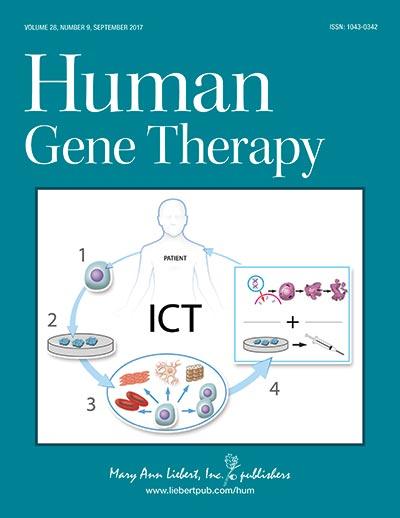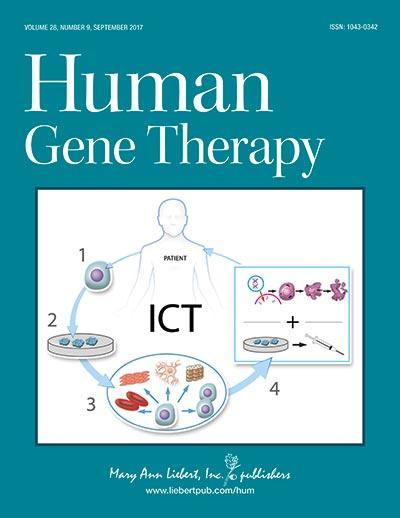
Credit: Mary Ann Liebert, Inc., publishers
New Rochelle, NY, September 18, 2017–Researchers used gene transfer to block the expression of one of the two main enzymes that break down alcohol in the liver, leading to the accumulation in liver cells of acetaldehyde, a metabolic byproduct of ethanol. The inability to metabolize acetaldehyde produces strong effects in people, such as dizziness and palpitations, leading people to avoid alcohol and representing a novel approach to treating alcoholism, as described in an article published in Human Gene Therapy, a peer-reviewed journal from Mary Ann Liebert, Inc., publishers. The article is available free on the Human Gene Therapy website until October 18, 2017.
In the article titled "AAV Gene Therapy for Alcoholism: Inhibition of Mitochondrial Aldehyde Dehydrogenase Enzyme Expression in Hepatoma Cells" researchers Anamaria Sanchez, University of Chile, Santiago and R. Jude Samulski, University of North Carolina, Chapel Hill and coauthors used an adeno-associated virus (AAV) vector to deliver a nucleic acid fragment called a small hairpin (sh)RNA into human liver cells in the laboratory. The shRNA targets and silences the gene for aldehyde dehydrogenase (ALDH2), reducing expression of the ALDH2 enzyme by up to 90%. As a result, when exposed to ethanol, the gene therapy-treated cells had 50% higher acetaldehyde levels.
"Alcohol and other substance use disorders, together with the associated problem of suicide, are driving an alarming increase in mortality among middle-aged Americans in recent years," says Editor-in-Chief Terence R. Flotte, MD, Celia and Isaac Haidak Professor of Medical Education and Dean, Provost, and Executive Deputy Chancellor, University of Massachusetts Medical School, Worcester, MA. "What has not often been recognized is that genetic factors account for over 70% of the risk of alcoholism, based on twin studies. This suggests that genetic therapy would be a logical approach. These investigators have targeted one of the best established genetic contributors and demonstrated strong proof-of-concept data with a rAAV vector-mediated shRNA approach. This bodes well for future development of this therapy."
###
About the Journal
Human Gene Therapy the Official Journal of the European Society of Gene and Cell Therapy, British Society for Gene and Cell Therapy, French Society of Cell and Gene Therapy, German Society of Gene Therapy, and five other gene therapy societies, is an authoritative peer-reviewed journal published monthly in print and online. Led by Editor-in-Chief Terence R. Flotte, MD, Celia and Isaac Haidak Professor of Medical Education and Dean, Provost, and Executive Deputy Chancellor, University of Massachusetts Medical School, Human Gene Therapy presents reports on the transfer and expression of genes in mammals, including humans. Related topics include improvements in vector development, delivery systems, and animal models, particularly in the areas of cancer, heart disease, viral disease, genetic disease, and neurological disease, as well as ethical, legal, and regulatory issues related to the gene transfer in humans. Its companion journals, Human Gene Therapy Methods, published bimonthly, focuses on the application of gene therapy to product testing and development, and Human Gene Therapy Clinical Development, published quarterly, features data relevant to the regulatory review and commercial development of cell and gene therapy products. Tables of contents for all three publications and a free sample issue may be viewed on the Human Gene Therapy website.
About the Publisher
Mary Ann Liebert, Inc., publishers is a privately held, fully integrated media company known for establishing authoritative peer-reviewed journals in many promising areas of science and biomedical research, including Nucleic Acid Therapeutics, Tissue Engineering, Stem Cells and Development, and Cellular Reprogramming. Its biotechnology trade magazine, GEN (Genetic Engineering & Biotechnology News), was the first in its field and is today the industry's most widely read publication worldwide. A complete list of the firm's 80 journals, books, and newsmagazines is available on the Mary Ann Liebert, Inc., publishers website.
Mary Ann Liebert, Inc. 140 Huguenot St., New Rochelle, NY 10801-5215 http://www.liebertpub.com Phone: (914) 740-2100 (800) M-LIEBERT Fax: (914) 740-2101
Media Contact
Kathryn Ryan
[email protected]
914-740-2250
@LiebertPub
http://www.liebertpub.com
Original Source
http://www.liebertpub.com/global/pressrelease/new-study-shows-promise-of-gene-therapy-to-treat-alcoholism/2253/ http://dx.doi.org/10.1089/hum.2017.043





